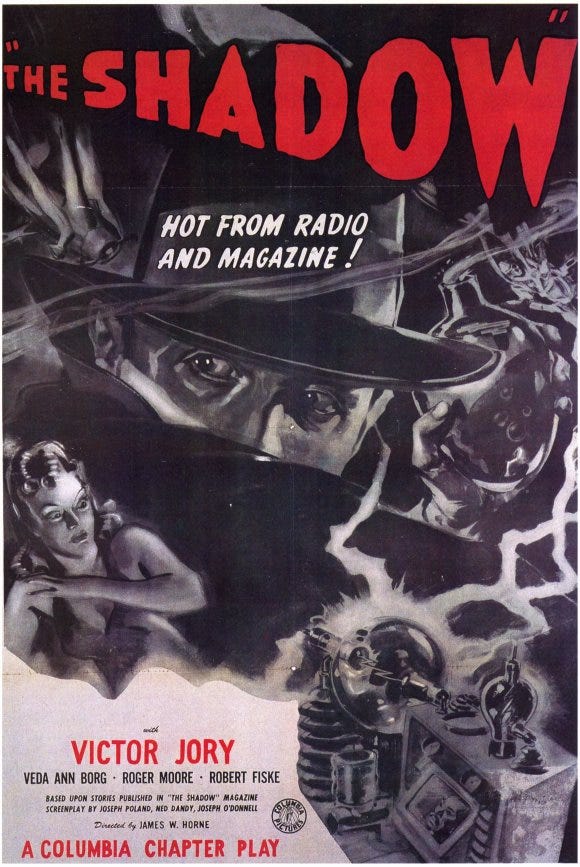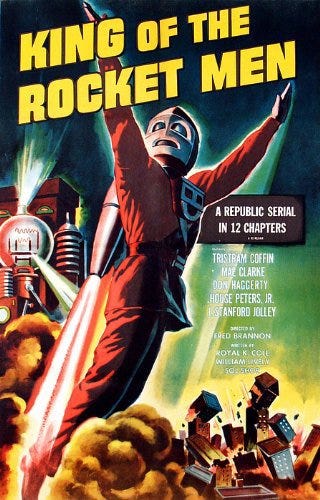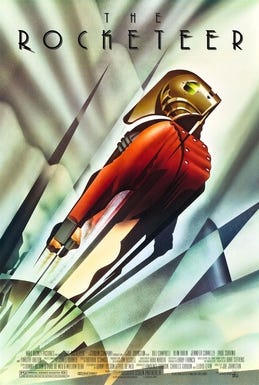Movie Serials: In Search of Lost Treasures
A highlight on the charm and camp of the Hollywood chapter play
Editor’s Note:
And now for something completely different.
We are kicking off today with a new series for the magazine called, Lost Treasures. Join me as we journey to the time of cheap thrills on the big screen. I will be looking back at the campy film serials and B-movies of Hollywood, as well as some old forgotten gems, to provide historical context and a bit of commentary about how they came to be. To help jumpstart this series, enjoy this article I wrote last August for The Pulp Fictioneer.
- Frank Theodat

There is something truly special about discovering lost history. When I wrote my reflection piece about the old days of radio drama it allowed me to do two things:
Pay tribute to an almost forgotten art form
Share my admiration for such art with others
My hope is to write more of these tributes (at least once a month) to keep these lost treasures alive in the minds of others. A tiny contribution.
My love of movies began at the age of 8. My dad took me to see a truly cinematic masterpiece; a story of British prisoners plotting their escape from a brutal work camp…Chicken Run.1 Thus movies became my first love.
I’ve been spending some extra downtime watching a few of the old movie serials online and must admit it has become an obsession. It led to an impulsive book purchase of “Blood N’ Thunder’s Cliffhanger Classics”2, a book of essays on the famous cinematic chapter plays edited by Ed Hulse.
Hulse gives an excellent primer and offers a collection of well researched essays that will educate and entertain anyone who is the least bit curious about these gems.
The Chapter Play
For those unfamiliar with the chapter play, they began with the Silent Era of cinema, reaching popularity in the ‘30s until their peak in the ‘50s. The chapter play offered moviegoers shameless escapism with weekly short films. Popular with children and teenagers, each chapter play would raise the stakes and pump up the excitement to entice audiences to return to the theater next Saturday with a dramatic cliffhanger.
Production costs were cheap compared to most features made in Hollywood, even back in those days. The attitude of studios, such as Universal, Columbia, and Republic, was to churn out these pictures to keep up with demand. Stunt men, beautiful women, and young actors with a glimmer of charisma starred in these films, many of whom built solid careers in the serials and even went on to become legendary stars, such as Western legend John Wayne.
Based on the cheap cost, emphasis on outlandish plots, and serialized nature, it would not be far-fetched to see how the pulps influenced much of these films. Many of the famous pulp characters like The Shadow, Tarzan, The Spider, and Zorro were adapted into popular movie serials.
Iconic superheroes such as Superman and Batman also found their way into matinees, bringing each character to the big screen for the first time. Hundreds of serials covered a wide range of genres with jungle adventures, spy thrillers, westerns, aviation, crime, and science fiction giving audiences a wide variety of films to choose from.
The serials left a tremendous impact on mainstream culture. For one, the melodramatic cliffhangers seeped their way into Saturday morning cartoons of the ‘60s and onward. Artists who grew up tuning into these films as kids went on to make their own action-packed stories as adults. The obvious are George Lucas with Star Wars and Steven Spielberg (collaborating with Lucas) with Indiana Jones. Serials like King of the Rocket Men and Commando Cody went on to influence Dan Stevens’ pulp comic hero The Rocketeer, which later was adapted to the big screen in 1991.
Combing through a playlist of these films in all their campiness has truly been a treat. The movie experience of today leaves much to be desired. I long for a time when a trip to the movies was a weekend affair. Small, local cinemas offer a variety of features you could spend all day inside with fists full of popcorn. There are plenty of gems out there to be seen and to support, so not all hope is lost. Most of the serials have been restored on DVD and Blu-ray for collectors and aficionados. I, for one, plan to make room in my already cramped study for a shelf dedicated to these charming pictures for me and my son to enjoy.
Will the chapter play ever return to the big screen?! Will audiences abandon the streaming giants in exchange for an audacious camp at their local cinema?! Are we due for a revival of cheap thrills?!
The answer to these and many other exciting questions next week!
Same time! Same channel!
I believe Chicken Run is one of the greatest movies of all time. If you disagree with that statement, I do not wish to know you and you can kick rocks…







YES.
Chicken run is the greatest animated film of all time.
This is going to be fun, time to dust off that old time Republic Pictures mountain and eagle logo.